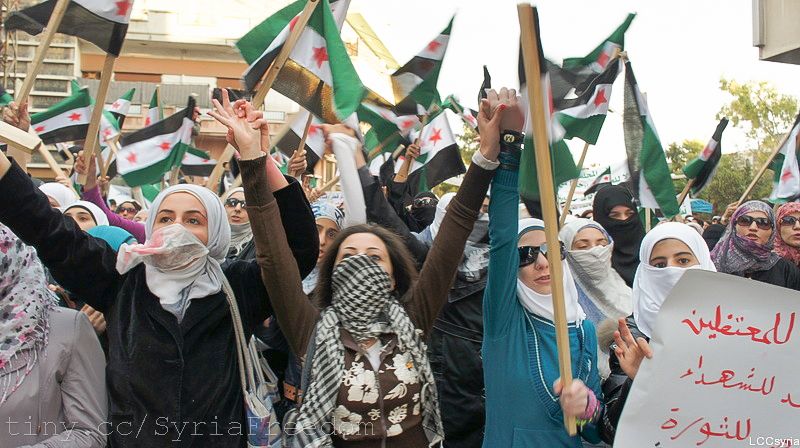
Mainstreaming women’s voices in Syria’s transition
“You know there’s hundreds of thousands of girls like you, you’re not alone in this revolution,” Ms. Yaman Al Qadri, then 18, reminded herself after being arrested by police, detained, and tortured with electric shocks. Al Qadri, a peaceful Syrian activist, was held in detention for 23 days in 2011 for throwing pamphlets from the roof of a Damascus University building. While extraordinary, countless Syrian women share similar experiences, efforts, and determination. Along with the mounting lessons from history, this brings to light an important truth: Mainstreaming women’s voices is critical to the inclusive transition that Syria needs.
In a recent conversation with the SJAC, Al Qadri described with awe how her disappearance drew immediate attention in Syria. As a young medical student committed to peaceful action, her arrest sparked outrage and widespread demands for her release. Shortly after she was released, Al Qadri fled to Canada where she continues her studies while fundraising and raising awareness about important issues in Syria. A Facebook page devoted to her, “Free Yaman Al Qadri,” has over 22,000 “likes” and now, more than a year after her release, serves as a lively forum supporting non-violence and women in the uprising.
As part of her efforts, Al Qadri is acting in a play touring the US and Canada. Called, “Khluna Nahki” or “Let’s Talk,” the show tackles complex situations and feelings that Syrians have about the uprising. Al Qadri’s character addresses the rape of a young girl and its effects on her family perceptions of honor. Al Qadri adamantly rejects the common association of rape victims with shame, emphasizing rape is “a kind of torture and it’s happening to men and women as well.” She adds, “They use it to break you, to break your soul.” The scene sheds light on a loaded topic and is having an effect. “A lot of people complimented me, many cried. If someone was affected by the scene, if they were changed, about how they see these girls—this is what I want.”
Such messages prove once again how the agenda of women is not just the “women’s agenda.” Al Qadri’s goals and experiences could be multiplied throughout Syria, and changing the conversation around conflict, victimization, agency, and solidarity is an important tool for easing post-conflict transition.
Earlier this month Ms. Sanam Anderlini met with the SJAC team to discuss ways women’s narratives can be mainstreamed through transitional justice mechanisms. Anderlini, co-founder of the International Civil Society Action Network (ICAN), has been involved in civil society activism for 18 years and helped draft UN Security Council Resolution 1325 on women, peace, and security. Anderlini described how women’s participation in transitional justice gives them a say in the collective definition of justice and in shaping the goals of any punishment, reconciliation, or reparations strategies.
Mainstreaming women’s narratives also challenges impunity for sexual crimes, which importantly opens the space for male victims to come forward. Women can add perspectives on the conflict as witnesses and active participants. Moreover, understanding the post-conflict priorities of women—be it the punishment of perpetrators, memorialization, or provision of services that help Syrians to move beyond the conflict—will help identify the needs of all affected communities.
Unfortunately, says Anderlini, woman’s inclusion and gender-sensitive approaches don’t come naturally. Truth and/or Reconciliation Commissions, for instance, might have to consider special women’s-only hearings to avoid the targeting of women who testify. They should take efforts to encourage participation by women in all stages, which requires thoughtful planning. Protection from abusers, community security, and counseling could prove beneficial. And, as with men, bringing on respected community leaders as stakeholders can ease individual doubts about participation.
Deliberately inclusive mechanisms will go a long way to ensuring that women’s voices integrally shape the Syrian discourse on transition. When asked if she wants to return to Syria, Al Qadri quickly answered “Definitely. She sees a lot of rebuilding work to be done. “I have to be able to help when I go back.” Inclusive transitional processes can help Syrian women to help Syria.
Signup to receive the SJAC’s Weekly Updates here.
Follow us on Twitter at SJAC_info.